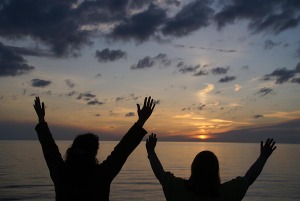WHAT DOES BEING ‘SPIRITUAL NOT RELIGIOUS’ REALLY MEAN?
 On March 19th, my blog post was entitled The Top Ten Religious Words that the Spin Doctors Doctored. Under #6 was the word ‘religion’, I wrote: “I don’t want to beat a dead horse here. I mean, after all, hasn’t this word been bludgeoned enough. But, this word, which has come to represent difference and divisiveness, was originally just a verb, religio, meaning ‘bringing together that which is separated.’ So, all I’m gonna say is, huh?”
On March 19th, my blog post was entitled The Top Ten Religious Words that the Spin Doctors Doctored. Under #6 was the word ‘religion’, I wrote: “I don’t want to beat a dead horse here. I mean, after all, hasn’t this word been bludgeoned enough. But, this word, which has come to represent difference and divisiveness, was originally just a verb, religio, meaning ‘bringing together that which is separated.’ So, all I’m gonna say is, huh?”
My intention in this post is not to try to get you to go to church or not go to church, but to think about the implications involved in the personal belief statement of being “spiritual but not religious.”
When I’m at a party, the gym, at a school function…and I hear, “Oh, I’m spiritual not religious”, I always ask what the person means by that. Usually, the answers are a combination of the following, “I didn’t agree with a lot of what the xyz church that I grew up in believes”, “I don’t get anything out of going to church”, “Religion is a construct created by the powerful to appease the poor and downtrodden”, “They’re so hypocritical, the church leaders and so many people I know that go to church”, and so on.
 You know what, I agree with a lot of what they tell me. There has been a lot of “unholy alliances” between individuals, governments, and church bodies. Much of what they articulate about why they don’t go to church or practice a faith or why they feel disillusioned or skeptical about much of what is essentially dogma (a good working definition of dogma being, “a corpus of doctrines set forth in an authoritative manner by a church”), are all things I can give a hearty Amen to.
You know what, I agree with a lot of what they tell me. There has been a lot of “unholy alliances” between individuals, governments, and church bodies. Much of what they articulate about why they don’t go to church or practice a faith or why they feel disillusioned or skeptical about much of what is essentially dogma (a good working definition of dogma being, “a corpus of doctrines set forth in an authoritative manner by a church”), are all things I can give a hearty Amen to.
So when people say they are not religious, they mean they have chosen not to limit themselves to the reduced definition of religion as a particular church, synagogue, or mosque with its doctrines, its own definitions of sin, salvation, and exclusions.
When they do express some of their spiritual practices or ways of experiencing the spiritual, there is also much to concur with. My Buddhist friends use a variety of meditations, both alone and in groups. And while some will agree that using the original meaning of religion, they are indeed religious. While others, on principle, still detest the idea. They prefer to call it a philosophy of thought. Here, again, semantics do indeed shape and inform our worldview. Whether it be early bad experiences with a “religion” that has scarred or the in-your- face fundamentalists whose fanatical zeal causes one to recoil…the result is the same.
 Some friends are in 12 step programs, recovering alcoholics, drug addicts, and their loved ones. One of the principles of these programs is that they are a spiritual not religious program. Again, meaning they are asking you to discover for yourself “God as you understand Him or Her” and to turn your life and will over to the care of this “Higher Power”. However, this is not done alone, but rather with the aid and support of the group.
Some friends are in 12 step programs, recovering alcoholics, drug addicts, and their loved ones. One of the principles of these programs is that they are a spiritual not religious program. Again, meaning they are asking you to discover for yourself “God as you understand Him or Her” and to turn your life and will over to the care of this “Higher Power”. However, this is not done alone, but rather with the aid and support of the group.
When I get a vague answer about trying to be a good person, they often add how they don’t need a church to become one (agreed). Most of the people who say this, I know to be good people, caring and true. So, when I ask them if they could be a bit more specific, they say things like they go weekly with their family to volunteer at a food bank or they are a part of quilting bee that creates blankets for those undergoing cancer treatments. All of the above examples include a component of community as part of the individual spiritual framework.
 “My own kind of prayer” and “being in nature” (responses I often get) are also spiritual experiences and are vital parts of the equation, but are not complete without the balance of others. I too often find a centering while walking in the woods, a wonderful “un-lonely” solitude, that feels a communion with God. Yet it also feeds me so that I can help, serve, and nurture others and that I am able to receive the same from them.
“My own kind of prayer” and “being in nature” (responses I often get) are also spiritual experiences and are vital parts of the equation, but are not complete without the balance of others. I too often find a centering while walking in the woods, a wonderful “un-lonely” solitude, that feels a communion with God. Yet it also feeds me so that I can help, serve, and nurture others and that I am able to receive the same from them.
In closing, an excerpt from A House for Hope by John Buehrens and Rebecca Parker:
“Is it really preferable (0r even possible) to be religious alone? Or, is there an importance to religious community life that need to be claimed anew, while protecting against the liabilities and dangers that community life can pose? I strongly believe the answer to the first question is no and the answer to the second is yes. We need life together, and we would be wise to invest in rebuilding the walls of community. My suspicion is that religious conservatism has grown not because its theology is more inspiring than that of liberal theology, but because conservatives in recent decades have been better at creating and sustaining religious communities that offer people meaningful connection with one another and support in enduring life’s trials and tribulations.”
So…I am back, congregants of the blogosphere!…new job…yada yada.
